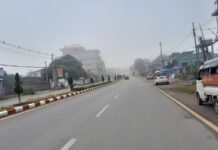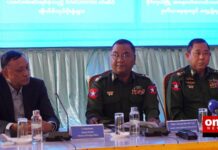Once again the 71st Anniversary Union Day was celebrated with the aim, as prescribed by the National League for Democracy (NLD) government according to its four objectives, which were: to develop the Union Spirit; to make the internal peace process a success with unity of the ethnic people; to build a Federal Democratic Union through the Union Peace Conference – 21st Century Panglong; and to boost the economy of the Union by encouraging small and medium enterprises.
Besides using the much controversial terms “Federal Democratic Union” on the Ministry of Information website, State Counselor Aung San Suu Kyi in the NLD’s statement on the occasion said: “Panglong Agreement is not only an agreement written on the paper but it is the promise signed (ingrained) in the heart,” according to the report of Myanmar Times Burmese language report on the Union day.
Coinciding with the celebration is the promised signing of the Nationwide Ceasefire Agreement (NCA) by the New Mon State Party (NMSP) and the Lahu Democratic Union (LDU) which took place one day after the Union Day ceremony.
Background
It is interesting to note that the promulgation of Union Day on 12th February 1947 is so unanimously
linked and intertwined with the emergence of the modern Shan State, its national day and the formation of the Union of Burma, it is almost impossible to discuss the making of this historical formation separately.
 As it is, the Shan on 7th February 1947 promulgated Shan National Day and entered the record as a modern nation. On that day the Shan princes and the people’s representatives of the Federated Shan States demonstrated their newfound unity to declare it a “national day” which were followed by the resolutions of “Shan National Anthem”, “Shan National Flag” and the formation of “Shan State Council” on the 11th and 15th of February, 1947 respectively, and agreed.
As it is, the Shan on 7th February 1947 promulgated Shan National Day and entered the record as a modern nation. On that day the Shan princes and the people’s representatives of the Federated Shan States demonstrated their newfound unity to declare it a “national day” which were followed by the resolutions of “Shan National Anthem”, “Shan National Flag” and the formation of “Shan State Council” on the 11th and 15th of February, 1947 respectively, and agreed.
The Panglong Conference that followed on 12th February 1947 produced the Panglong Agreement between the Bamar or Burmese State represented by Gen Aung San and the ethnic nationalities Chin, Shan and Kachin to form a union on equal basis.
It is not an exaggeration to state that without Panglong Agreement or Accord, signifying the intent and willingness of the free peoples and nations of what could be termed British Indochina, there would have not been born the Union of Burma in 1948.
The Union Day is in fact the signing of Panglong Agreement and the meaning and aspirations of the ethnic nationalities, if not their counterpart the Bamar leaders, are best explained by looking at the said agreement a bit more thoroughly.
When examining the Panglong or Union contract, it is essential to look at the agreement, promises and spirit, in order to grasp the meaning encompassing the treaty or agreement.
Panglong Agreement
Point 1-4. Shan, Chin and Kachin representatives will be appointed as minister and deputy ministers respectively responsible for matters relating to Frontier Areas affairs
Point 5. Full autonomy in internal affairs
Point 6. A status of state for the Kachins in the future independent Union. (The Chins then did not request the same status)
Point 7. Rights and privileges fundamental in democratic countries (which is interpreted as human rights and democracy)
Point 8-9. Financial autonomy as in the Federated Shan States for Chin and Kachin
Panglong Promises
During the 4-day negotiations in Panglong, 8-11 February 1947, the following demands were made by the Joint Chin-Kachin-Shan Committee, officially dubbed Supreme Council of the United Hill Peoples (SCOUHP):
- The right to secede if and when we choose
- Equal status
- Joint responsibility for common subjects such as foreign affairs, defense and coinage and currency
Gen Aung San reportedly had accepted all in principle but requested that they be included in the Union Constitution to be a drafted by the upcoming Constituent Assembly instead. His solemn word of honor thus became known as the promises of Panglong.
Panglong Spirit
Judging by what the Bamar leaders have repeatedly said, the much-vaunted Three National Causes (Non-disintegration of the Union, Non-disintegration of National Solidarity, and the Perpetuation of National Sovereignty) appears to be their interpretation. To the non-Bamar ethnic nationalities, this summing-up means they have to live under Bamar domination as second class citizens whether they like it or not.
However, the ethnic nationalities’ interpretation of the Panglong Spirit is equal status, sense of joint ownership and sense of joint responsibility. But it has not been sought out by the Bamar leaders, let alone agreeing to it.
What the ethnics think
The 1962 military coup took place because the Military or Tatmadaw and as well the Bamar political elite cannot bear to become equal partner in relation to the other ethnic nationalities. While the coup gave the pretext to save the union from disintegration and uphold national unity, the real reason is to maintain the political advantage and preserve the Bamar-majority political monopoly. In other words, the powers that be, including the military and Bamar political elite, wanted to preserve their racial supremacy stance and treat the ethnic nationalities as their colonial possessions, as if been taken over the mantle of British overlord.
Prior to the coup, the ethnic nationalities tabled a federal amendment proposal,which they had drawn up together in Taunggyi Shan State, in the parliament, to correct the imbalance political power-sharing nature and make the country more federal. This angered the Tatmadaw and led to the coup d’etat. Since then the struggle for ethnic rights of self-determination has escalated which bloomed into nationwide resistance against the occupying Tatmadaw’s troops, while political movements within the legal fold are either banned or contained.
Recently, The Irrawaddy conducted interviews with some ethnic leaders who said that they are all disappointed with the situation.
Colonel Naw Bu, a spokesperson for the Kachin Independence Army said: “It is not a real Union. I feel the country’s indigenous ethnic people have been treated like second-class citizens.”
“We have mixed feelings on Union Day, as we do not yet have freedom, we do not have equal rights, and we have yet to achieve political rights,” he added.
Arakan National Party lawmaker U Pe Than said that the ethnic people trusted Gen Aung San and that he would be able to secure equal rights for them after independence.
However, he said, “Today, we have a Union in name only. We need a genuine Union. But the Bamar alone have ruled this Union for many generations and they remain the most influential group within it.”
In the same vein, Colonel Sai Oo, a spokesperson for the Restoration Council of Shan State said: “Until our country has equal rights, we can not recognize this as a real Union. They took it all [the country’s natural resources] under their control as they were the majority group. They really should share it.”
To sum up, the struggle for the rights of self-determination, justified resources-sharing, democracy and equality anchored in a genuine federalism, which have started out in 1962 within the legal fold continues to these days, although unfortunately it has branched out more into the category of armed resistance. But whether the new found accommodation of NLD government would find acceptance among the Tatmadaw’s top brass and lead to political settlement remains a question that only time could answer.











Leave a Comments